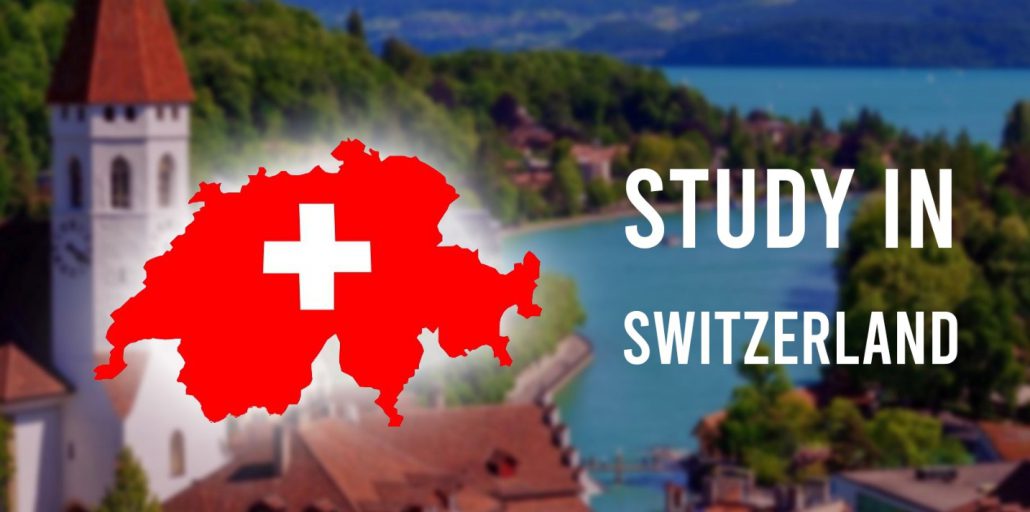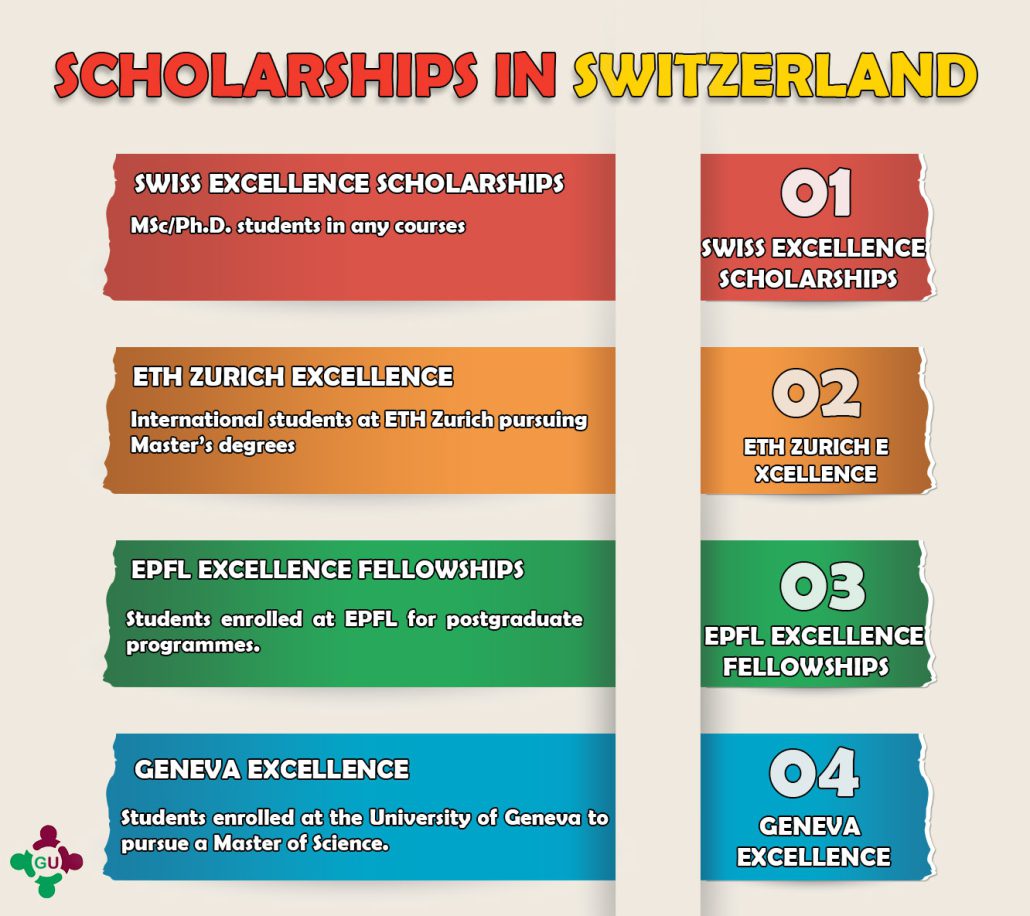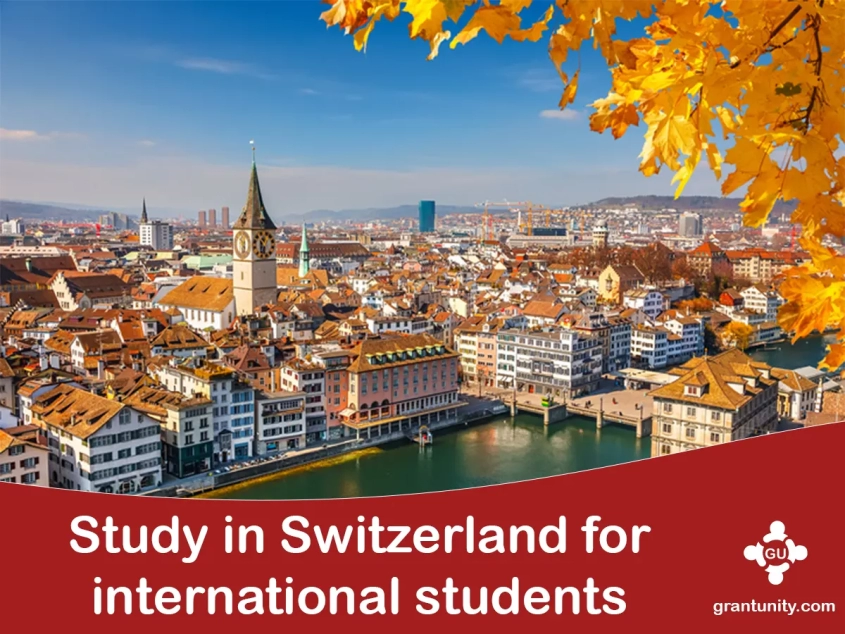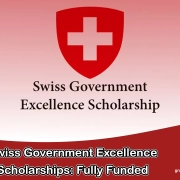Study in Switzerland for international students free (2024-2025)
Estimated reading time: 14 minutes
Switzerland is known for its stunning beauty and is also a popular destination for international students who wish to study abroad. The country boasts highly esteemed universities, first-rate research facilities, an ideal student-to-faculty ratio, and affordable tuition fees. In recent years, an increasing number of international students have been selected to study in Switzerland, which is why 26% of immigrants are currently residing in this country. International students studying in Switzerland can expect high educational standards and improved job prospects due to the country’s thriving economy and proximity to established businesses.
Education in Switzerland: Highlights
Here is a list of the key information you should know about Switzerland as an international student who wants to study there:
| Criteria | Description |
| Instruction language | English, Dutch, and French |
| Required language test | IELTS, TOEFL, PTE, GRE, GMAT |
| Average tuition & fees | 250-900 CHf/semester |
| Average living cost | 1,500 – 3,000 CHf/ month |
| University funding sources | Grants, Scholarships, and part-time jobs |
| Intakes period | Two intakes every year. February-March and July-September |
| Student visa type | C-VISA (stay less than 3 months), D-VISA (stay more than 3 months) |
| Degree levels | Diploma, Undergraduate (Bachelor’s), and Graduate (Master’s and Ph.D.) |
| Top cities for students | Zurich, Lausanne, Geneva, Bern, Basel |

Why should I study in Switzerland?
Switzerland is home to some of the best universities and cutting-edge research facilities in the world, making it an excellent choice for higher education. However, other advantages to studying in Switzerland make it an attractive option for international students, including those from India. Below are the main reasons why Switzerland is a great destination for higher education.
1-High-quality universities with interactive teaching methods can be found in Switzerland.
2-Switzerland is a friendly, safe place that welcomes people from different cultures.
3-For International students, the advantage of speaking multiple languages is the main reason to study in Switzerland. Students who study these languages will be able to communicate more effectively with locals and enhance their resumes.
4-Another important factor for studying abroad in Switzerland is the vibrant social scene. For students, there are many festivals, locations, and travel opportunities.
5-The choice to study abroad in Switzerland may result in job offers with high salaries. Switzerland’s residents are renowned for maintaining high standards of living, which is evidence of their wealth.
Educational system in Switzerland (2024-2025)
The main attraction for international students applying to study in Switzerland is its educational system. Higher education is provided in Switzerland by numerous institutions. These institutions offer a variety of degrees, including:
1-Bachelor’s Degree: A full-time undergraduate degree that typically takes three to four years to complete.
2-Master’s Degree: A Master’s degree typically requires 1.5–2 years of full-time study to be finished.
3- Master of Applied Science (MSc): This postgraduate degree typically takes 1-2 years to complete and entails coursework, independent study, and a master’s thesis.
4-PhD Degree: The duration of a doctoral degree is three to five years.
Following is a detailed overview of the various university types in Switzerland:
| Institution type | Highlights |
| Universities of Teacher Education | Provide teaching programs at the preschool, elementary, secondary level I, secondary level II, and special needs levels. |
| Universities of Applied Sciences and Arts | Present a practice-based Master’s and Bachelor’s degree programs |
| Universities | Institutions of higher learning that specialize in research |
Besides the universities, other higher education institutions, such as business schools, medical schools, music schools, and hospitality schools, are available in Switzerland.
Credit Criteria in Switzerland
All universities in Switzerland adhere to the Bologna Process, which is based on the same credit system called the European Credit Transfer and Accumulation System (ECTS credits). The final calculation is based on a student’s credits throughout the course.
1-In order to graduate from a three-year bachelor’s program in Switzerland, students must earn 180 ECTS credits overall.
2-A Master’s level degree requires between 90 and 120 credits to complete. 60–120 ECTS are necessary to earn a MAS degree.
3- Students must be able to complete 240 ECTS credits to receive a doctorate.
Top universities in Switzerland (Update 2024)
Some of the best universities in the world are located in Switzerland. The (Times Higher Education) ranking has recorded some of the top universities in Switzerland are listed below:
Universities in Switzerland offer a strong and proven track record of education courses with useful courses and programs. There are several university ranking systems in use across the world; the following three are the most well-known parameters:
1- Academic reputation of instructors and programs.
2-Ease of education for international students.
3-Job opportunities after graduation.
Switzerland is home to several prestigious universities. See Switzerland’s top universities in the below table:
| Institution name | THE Ranking in 2024 | Portion of international students | Avg. tuition & fees/Semester |
| ETH Zurich | 15 | 41% | 600-1,000 CHf |
| Swiss Federal Institute of Technology Lausanne | 40 | 62% | 600-1,000 CHf |
| University of Zurich | 75 | 22% | 1,000-1,300 CHf |
| University of Bern | 101 | 16% | 400-600 CHf |
| University of Basel | 103 | 30% | 700-1,000 CHf |
| University of Lausanne | 176 | 23% | 500-600 CHf |
| University of Geneva | 197 | 39% | 400-600 CHf |
| USI – Università della Svizzera italiana | 301-350 | 67% | 3,800-4,500 CHf |
| University of St.Gallen (HSG) | 301-350 | 33% | 2,800-3,500 CHf |
| Université de Fribourg | 401-500 | 17% | 1,800-2,400 CHf |

Top courses in Switzerland (Update 2024)
Higher education and institutions in Switzerland provide a wide variety of course options. The following are a few of the top courses in Switzerland for foreign students:
1- Business Management
2-Hotel & Hospitality Management
3-Finance & Banking
4-Artificial Intelligence
5-International Law
6- Quantitative & Systems Biology
7-Applied Mathematics
8-Science that crosses disciplines
The most well-liked courses selected by students in Switzerland are:
| Course | Duration | Avg. tuition & fees/semester |
| Bachelor of Business Administration | 3-4 years | 12,500-14,000 CHf |
| BA Hons (International Hospitality Management) | 2-3 years | 2,800-3,500 CHf |
| MSc Mechanical Engineering | 1/5-3 years | 1,000-2,000 CHf |
| MA Banking and Finance | 1/5-3 years | 2,500-3,500 CHf |
| Master in Interactive Design | 3 semesters | 1,200-1,800 CHf |
| Masters of International Business | 1-3 years | 30,000-40,000 CHf |
| Master of Business Administration | 1-2 years | 10,000-13,000 CHf |
| Master of Science in Artificial Intelligence | 1-3 years | 3,500-5,000 CHf |
Admission Process of Universities in Switzerland (Update 2024)
1-Investigate the education system and the types of universities in Switzerland.
2-Identify the colleges and universities that offer courses in the subjects you are interested in. Based on the programs and curriculum, narrow down your list of universities.
3-Each of the universities you have shortlisted should be compared for tuition costs and scholarship opportunities.
4-Make a list of the documents needed for the application process and check the eligibility requirements for each program.
5-Complete the application form and upload all necessary paperwork. Pay the necessary application fee.
6-Await the return of the universities. You can apply for a student visa after being accepted.
Admission requirements in Universities in Switzerland (Update 2024)
You must satisfy several requirements depending on the course you want to study in Switzerland. If you check off all of the boxes below, your admission application will be taken into consideration:
| Degree type | Requirements |
| Undergraduate (Bachelor’s) Degree | 1-High school academic transcripts 2-Language proficiency in English, German or French |
| Graduate (Master’s) Degree | 1-Bachelor’s degree in any relative field. For research-oriented programs, 2-CV, LORs, and SOPs 3-Language Proficiency test in German, French, or English(IELTS/GMAT/GRE) |
| Doctorate Degree | 1-Master’s degree in the field in which you are interested in conducting your research. 2-Relevant Research/ Work Experience 3-CV 4- SOP and recommendation letter |
Education costs in Switzerland (Update 2024)
The cost of studying a particular program and university in Switzerland varies depending on the student’s lifestyle. Tuition fees and cost of living are the two main components of the entire cost of education.

| Degree type | Avg. tuition & fees/year |
| Bachelor’s Degree | €8,00-€4,000 |
| Master’s Degree | €8,000-€2,500 |
Living costs for international students in Switzerland
The cost of living varies for international students in Switzerland depending on their lifestyle. To study in Switzerland, an international student must pay a variety of fees, including:
| Criteria | Avg. living cost/month |
| Apartment housing, including utilities | 1,000-1,500 CHf |
| Food | 400-800 CHf |
| Travel | 200-400 CHf |
| Healthcare | 300-600 CHf |
| Miscellaneous | 600-1,200 CHf |
Top cities for international students in Switzerland
Even though it is a small nation, Netherlands has a wide range of cities where you can continue your education. The following list includes some of the top cities for international students to study in Netherlands:
| City | Avg. living cost/month |
| Zurich | 1,800-2,500 CHf |
| Lausanne | 1,800-2,200 CHf |
| Geneva | 1,800-2,200 CHf |
| Bern | 1,200-1,800 CHf |
| Basel | 1,800-2,300 CHf |
Student visa in Switzerland (Update 2024)
If you want to study in Switzerland, you need a student visa. Here is a step-by-step procedure for applying for a student visa in Switzerland:
1-When you receive an acceptance letter from a university in Switzerland, reach out to the Swiss Consulate in your country.
2-Complete a visa application form, then make an appointment at the Switzerland Visa Application Center.
3-Visit the consulate or embassy on the designated day and time. Bring the completed application form and all necessary documentation.
4- Submit the documents and pay the student visa fees. For Indian and other students, it is 150 CHf.
5- Collect the acknowledgment receipt and wait for the approval. If you’re applying for a short visa which is less than three months, it takes up to 10-15 days. However, for a long-term visa for more than three months, the time for a student visa can go up to 10 weeks.
Documents for student visa in Switzerland (Update 2024)
The below items are the required documents you will need to provide once you want to initiate your visa application in Switzerland as an internal student.
1-Filling out visa application
2-Proof of financial capability
3-Passport-sized photos
4-University admission letter
5-Copy of medical travel insurance
6-Valid passport
Top Scholarships in Switzerland (Update 2024)
Various government and non-government scholarships are available in Switzerland to aid foreign students in paying for their education.

The information on a few of the best scholarships is provided below:
| Scholarship name | Who is eligible? | Benefits/amount |
| Swiss Excellence Scholarships | MSc/Ph.D. students in any courses | Includes living expenses, education costs, insurance, travel expenses, and more. |
| ETH Zurich Excellence Master’s Scholarship | International students at ETH Zurich pursuing Master’s degrees | Roughly 60,000 CHf |
| Nestle MBA Scholarships for Women from Developing Countries | Female MBA candidates who are citizens of developing nations. | Roughly 24,000-30,000 CHf |
| Geneva Academy of International Humanitarian Law and Human Rights Scholarships | Students from abroad pursuing LLMs in International Humanitarian Law and Human Rights and MAs in Transitional Justice, Human Rights, and the Rule of Law | Ten months of living expenses in Geneva are fully covered by full scholarships. Partially funded scholarships pay for tuition. |
| EPFL Excellence Fellowships | Students enrolled at EPFL for postgraduate programmes. | Roughly 9,000-10,000 CHf/semester |
| UNIL Master’s Grants in Switzerland for Foreign Students | international students enrolled in the University of Lausanne’s Master’s program. | Roughly 1,500-2,000 CHf/month |
| University of Geneva Excellence Masters Fellowships | Students enrolled at the University of Geneva to pursue a Master of Science. | Roughly 12,000-16,000 CHf/year |

Job opportunities for students in Switzerland (Update 2024)
International students can find a variety of part-time jobs in Switzerland. International students are authorized to work full-time during semester breaks and 15 hours per week as part of the regulations when they study in Switzerland. Your employer will give you the necessary work authorization.
Students in Switzerland have a variety of options for part-time employment. Here is a list of the well-liked ones along with their typical salary.
| Part-time jobs | Avg. income/year |
| Store Assistant | 23-26 CHF |
| Travel Assistant/ Tourist Guide | 19-23 CHF |
| Research Assistant | 25-29 CHF |
| Sales Advisor | 21-25 CHF |
| Sales Assistant | 22-26 CHF |
Working after graduation in Switzerland (Update 2024)
For international students, there are additional benefits to studying in Switzerland. After receiving their degree, international students can work and remain in Switzerland. They do, however, need to meet a few requirements to be able to do so.

The average salary in Switzerland is one of the highest in all of Europe. There are numerous job openings in various industries, and the unemployment rate is about 3%. Here are the top industries in Switzerland with the most job opportunities after Master’s degree:
| Job Opportunity | Avg. income/year |
| Engineering | 90,000-100,000 CHf |
| Pharmaceuticals | 88,000-95,000 CHf |
| Data Science & IT | 85,000-90,000 CHf |
| Banking & Insurance | 95,000-100,000 CHf |
| Hospitality | 55,000-65,000 CHf |
PR (permanent residency) and work visa in Switzerland
After receiving their degree, international students in Switzerland are permitted to stay in the nation for a further six months. Those who can find work in Switzerland are given work visas. Those who are hired are given a visa for a work permit. As long as you work for a Swiss employer, the work permit will be valid.
Students must live in Switzerland for ten years to obtain Permanent Residence (PR), which allows them to stay for an extended period. If the following requirements are satisfied, PR may be obtained in five years:
1-No criminal history
2-A2 level language proficiency in your area of residence (oral)
3-A1 in written communication (Should take Language proficiency test if no skills are shown)
International students who choose to pursue their studies in Switzerland stand to gain greatly from the country’s high educational standards and promising job prospects. Students also get to experience the country’s diverse cultures, high quality of life, cutting-edge technology, and beautiful landscapes. Because Switzerland has always welcomed people from diverse cultures, traveling there is made simpler.
Frequently Asked Questions: Study in Switzerland
International students can only apply for the fall semester.
Students from the EU may work up to 15 hours per week without a work permit. Students are permitted to stay behind after receiving their degrees for a period of six months to look for employment and upon finding employment, to obtain a work visa.
There is no imposed minimum salary. Unskilled workers often make up to 2,200 to 4,200 francs per month under voluntary collective bargaining agreements, whereas skilled workers can make up to 2,800 to 5,300 CHf per month.
Make an appointment at the Swiss embassy or consulate in your area before applying for a visa. Because these things can and often do take time, it is important to make the appointment at least six months in advance.
You must provide documentation in either English, German, or French. You’ll need certified translated copies if they aren’t.
Although there is a 14-day period after arrival, you should apply for a residence permit as soon as you are in Switzerland. Three different kinds of residence permits exist:
Permit L: It allows visitors to stay in Switzerland for a year and is only renewable once.
Permit B: This permit is available for one year stay in Switzerland and has no renewal limit.
Permit C: Permanent residence.
The language of instruction at Swiss universities generally varies with where it is located. Numerous universities do, however, offer English-language programs because of the large number of international students in Switzerland (more than 25%). The majority of master’s and Ph.D. programs, on the other hand, are taught in English.
It’s best to learn the local language if you want to finish your undergraduate studies in Switzerland, even though English is becoming more and more common in Swiss colleges.
Academic excellence is typically required in order to be eligible for a Swiss scholarship. Additionally, to be eligible for most university scholarships, you must be accepted into one of their programs. International students will be required to present credentials that are current and accepted.
Governmental Swiss scholarships, which are given to postgraduate students and artists, also demand a high standard of academic achievement. These fellowships are meant to encourage international collaboration in research and exchange between Switzerland and other nations.
Many people may consider working in Switzerland to be a dream, and with good reason. The dream is furthered by the fact that locals and foreign nationals are both required to get the same pay under Swiss law. So, where can I get a job in Switzerland?
Here are some actions you ought to take:
Get a Swiss work visa.
Find out what jobs are available in Switzerland.
Find a job in Switzerland that is open.
Find out what languages are required.
Check to see whether you meet the requirements



Hello Dear Sir
i want study Undergraduate (Bachelor’s) Degree what’s Requirements and could you please Provide all Details about this Course.
Like Tuition Fee and everything about study in Switzerland
thank you